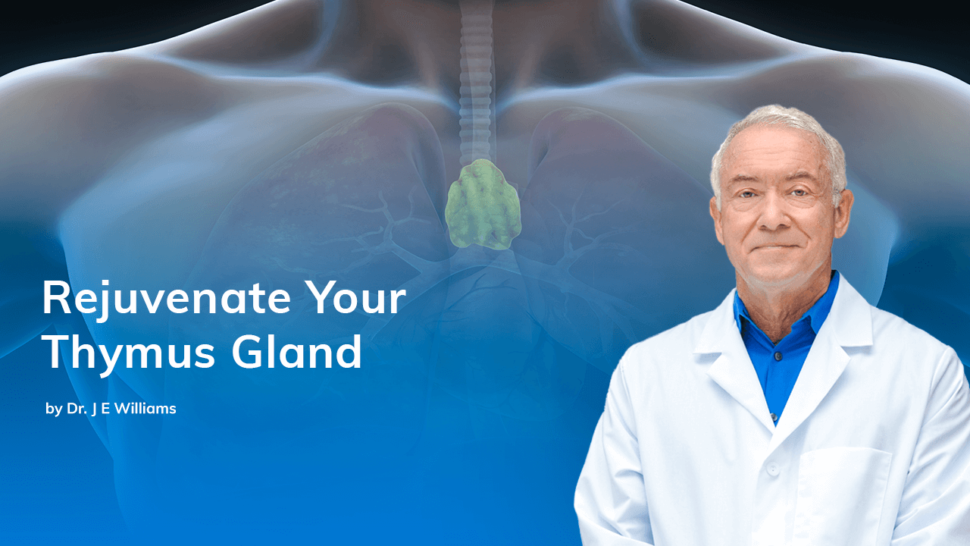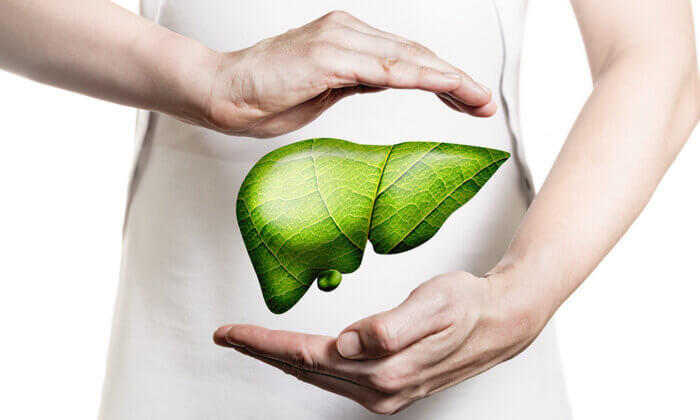Rejuvenate Your Thymus Gland
A healthy thymus enhances immunity to beat infections, prevent cancer, and extend lifespan.
| | Reading Time: 10 minutes
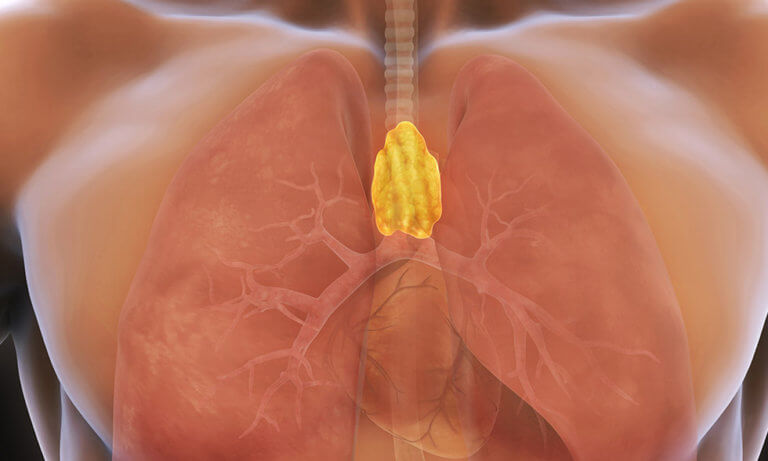
Imagine in the middle of the galaxy there’s a small, but essential asteroid that starships returning to Earth must visit to receive a vital nutrient mined in the asteroid’s interior. This substance revitalizes passengers and crew, so they’re well enough to complete the journey home. And it assures they’re immune-competent against Earth’s many infectious microorganisms.
The strangest thing about this asteroid is that few on Earth know it exists. And, those that do – like the captains of transoceanic voyages of old restocking water from remote islands – take it for granted. For decades, astronomers thought it was a piece from a dead planet, a redundant rock in space. But galactic travelers eventually learned the consequences were enormous when ignored.
Such an elixir exists in our body that’s essential for regulating immunity and supporting healthy aging. In a way, the thymus gland and the hormones it produces are the elixir of life on Earth. It not only provides immune balance to survive childhood infections and prevent cancer later in life, but also serves as a pacemaker for the human lifespan.
We don’t live well, and are not healthy, without the thymic elixir to balance our immunity with the biological life on this planet.
Like the unnamed asteroid, researchers ignored the thymus until Jacques Miller discovered its function in the early 1960s.[1] Even as late as 1963, the Nobel Laureate Sir Peter Medawar called the thymus “an evolutionary accident of no very great significance.” How wrong the knighted eminent scientist was!
Like the intergalactic substance, your body’s transformational thymic elixir enhances the body’s life support systems, keeping you alive and functioning for the remainder of your life’s journey. There’s no getting around it: the thymus is vital for health and longevity.
The Thymus Gland Is The Main Immune Organ
The thymus gland is located in the center of the chest behind the sternum, equidistant between the lungs just above the heart. It’s composed of two lobes. Each lobe has smaller sections called lobules, giving the thymus a bumpy appearance. This small bumpy gland provides a microenvironment, an incubator of sorts, for developing T cells critical for maintaining immunity. T cells are a kind of lymphocyte that are important in shaping the immune response.
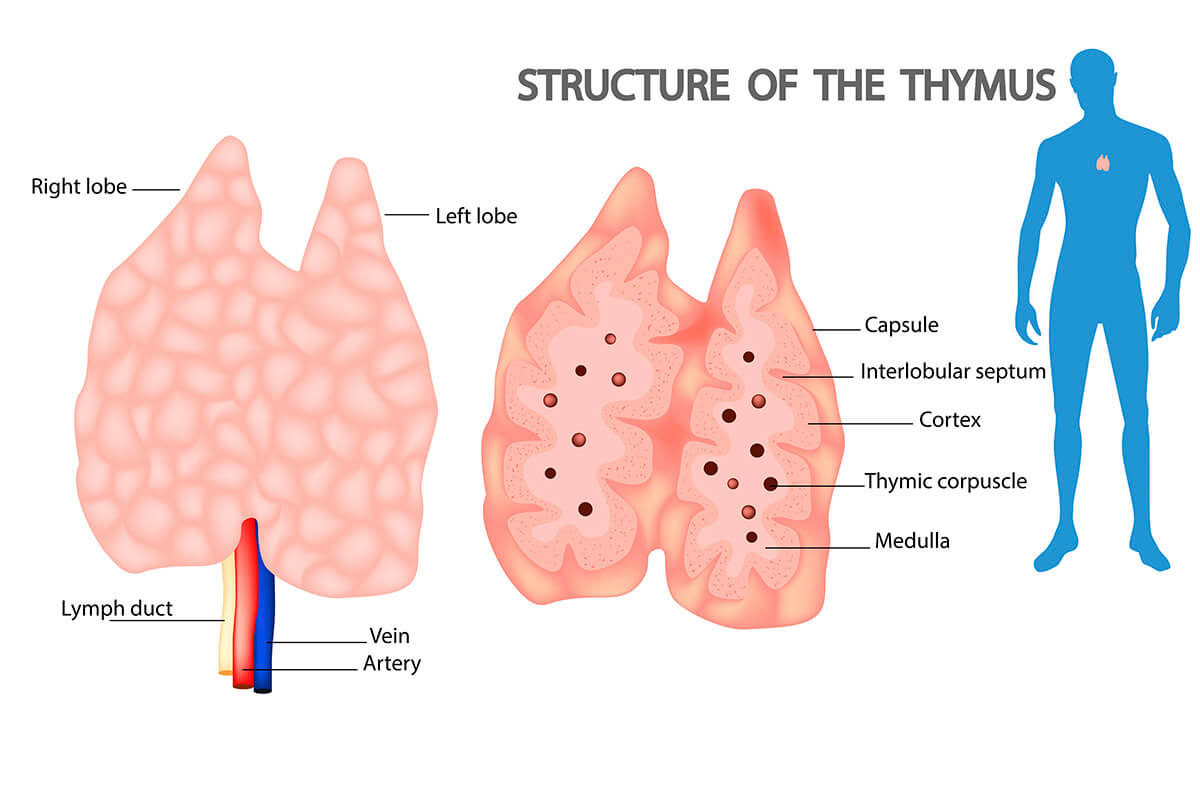
No one knows why the thymus functions at its peak when we’re young and weakens as we age. You would think it would stay strong throughout life, or even adapt and strengthen with age. But this weakened characteristic may explain why COVID-19 has fewer effects on children whose thymus is fully functional, and why the elderly succumbs easier. Our thymus atrophies as we age and its function becomes immunologically weaker.
The primary function of the thymus gland is helping develop T-lymphocytes (“T” is for thymus). The bone marrow produces immature T cells that make their way through the bloodstream to the thymus, where they mature into functional T cells essential for first-line immunity against foreign cells, including viruses.
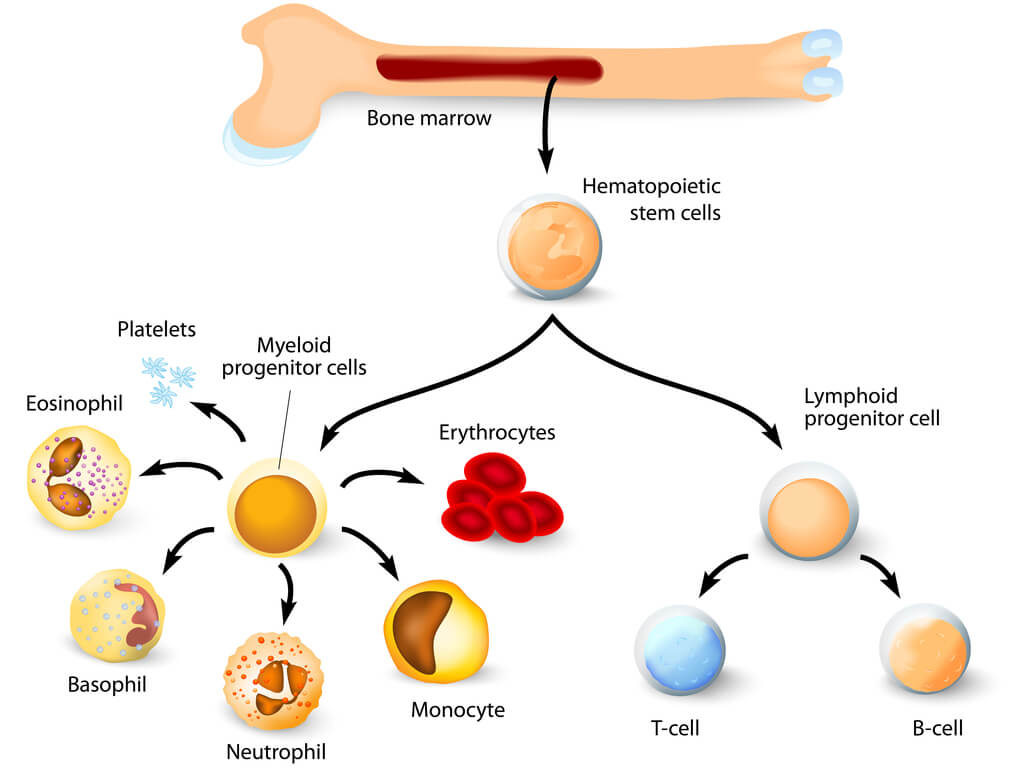
T cells play vital roles across the spectrum of immunity. They are involved in the inflammatory cascade, the vaccination response, and in allergies and autoimmunity. T cells are also implicated in gut dysbiosis, impaired metabolism, tissue repair, and maintaining a healthy pregnancy.
The thymus gland may look simple but it’s highly complex. Within the thymic lobules, T cell recruits are selected for competency and graduate as CD4+ “helper” or CD8+ “killer” lymphocytes.[2] The balance between CD4 and CD8 is critical for resistance to viral infections.
Besides T cells, the thymus produces hormones and immune regulating compounds called cytokines. But too many cytokines trigger an immune storm sparking a hyperactive response that can cause death. That was the case in the first SARS coronavirus infections. Patients were overwhelmed by the virus and their immune systems overly aggressive response. Cytokine storms are common in older patients with COVID-19 coronaviral infections. But, a healthy, well-functioning thymus keeps the immune system in balance.
Thymic function doesn’t end with immune cells and cytokines. Cells in the thymus gland produce biologically active substances, including hormones, the three main ones being: thymosins, thymopoiten, and thymulin. It also produces peptides and interleukins, a class of immune-modulating molecules like IL-6 that influence the inflammatory response to infection. And, help in beating cancer.
A healthy, competent thymus gland is essential to surviving infections, preventing cancer, and for prolonging health during aging. But if you’re 45 or 65 years old, how do you know if your thymus is functioning well enough. Unfortunately, there is no direct way of evaluating thymic function. For my patients with chronic diseases, and during aging, I order a T- and B-Lymphocyte lab test to assess immune status. Not enough of these primary immune cells indicate your thymus is underperforming. [3]
The Thymus as Lifespan Pacemaker
Anti-aging researchers and doctors knew about the importance of the thymus gland even before Dr. Miller identified T cells. In the 1930s, a Swiss physician, Dr. Paul Niehans, was among the first to inject patients with preparations made from animal thymus glands. In 1955, another Swiss physician and student of Niehans’, Dr. Alfred Pfister, developed a method to stabilize processed thymus cells, so doctors didn’t have to inject fresh extracts. And in the 1970s, a Swedish physician, Dr. Elis Sandberg, developed a high molecular thymus extract, the form still used today for thymus restorative therapy.
Besides training T cells, the thymus also makes hormones essential for immunoregulation during aging. One of these immune agents are thymosins, a group of hormone-like substances important in maintaining immune balance, as well as playing a role in regulating aging.
Even in healthy aging, the immune function deteriorates. That’s because, in humans, the thymus gland ages faster than the rest of the body. It reaches its peak during adolescence and begins to atrophy with a significant decrease in size and function by middle age. By 75 years, the thymus weighs only 1/6 of its maximum weight of 37 grams during youth.
Aging is inevitable and irreversible. Some age slower and live longer than others. But, sooner than later, everyone’s thymus shrinks. Declining thymus function with accompanying glandular atrophy contributes to susceptibility of infection, autoimmunity, and an increased risk for cancer.
We don’t know why the thymus gland atrophies at such an alarming rate, but aging researchers consider preventing thymic atropy pivotal in prolonging health during aging. So, it makes sense to protect your thymus starting around 35 years. And, becoming very proactive by ages 45-55.
I’m surprised that more functional medicine physicians and anti-aging doctors aren’t aware of the importance of the thymus as a pacemaker of aging. In a recent bestselling book on longevity by a prominent Harvard researcher there’s no mention of the thymus gland, not even an index entry!
As your thymic function weakens, you are susceptibility to common infections like colds and the flu. Persistent chronic illnesses with non-specific symptoms, like in chronic fatigue syndrome, that defy recovery are another indication of an under-functioning thymus gland. So is slower wound healing and other non-specific symptoms.
Since there’s no classical symptom pattern or lab tests that indicate a weakened thymus, there’s no medical diagnosis for thymus deficiency based on clinical signs and symptoms like there is for hypothyroidism. That’s one of the reasons I wrote this article: to develop a model of thymus deficiency and how to restore thymic function.
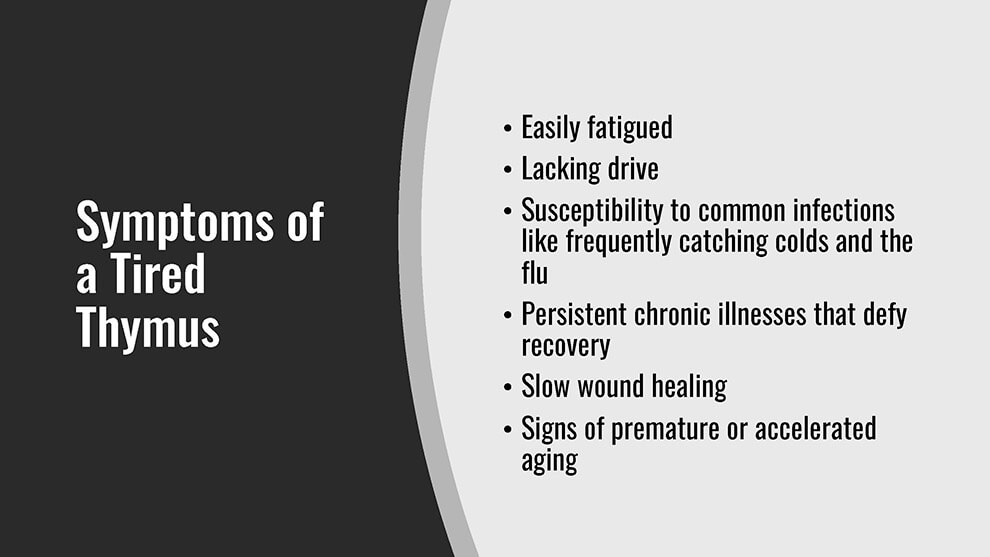
But researchers are sure about one thing: the size of the thymus affects the number of T cells in your blood. A smaller thymus produces fewer T cells resulting in a reduced immune response.
For example, the majority of deaths from COVID-19, as well as seasonal influenza, are due to respiratory tract complications leading to pneumonia, especially in those over 65 years. And those over age 65 have eleven times more cancer than younger people. You could say increased disease susceptibility in older people is due to weakened immune homeostasis because of a smaller, under-functioning thymus.
Strategies to Regenerate Thymic Function
When it comes to natural health, we ignore our thymus. That needs to change. Restoring the thymus is essential to surviving infections, preventing and beating cancer, and prolonging health during aging.
Fortunately for us, Europeans have more respect for healthy thymic function than Americans. Early in my clinical career, I worked with German naturopaths. I found their clinical skills and understanding of how the body functions decades ahead of our own. For one, they taught me several ways to support the thymus gland and restore thymic function. These methods included thymus injections, nutritional supplements, and herbal medicines to regenerate the thymus gland.
According to American natural medicine philosophy, everything begins with diet and lifestyle. But even though improving your diet supports general health and prevents degenerative conditions like cardiovascular disease, food alone doesn’t always cure disease, doesn’t treat infections, and cannot restore the thymus. In these cases, your body requires medicines. The best strategy is an integrated approach: a robust lifestyle and a healthy diet combined with a
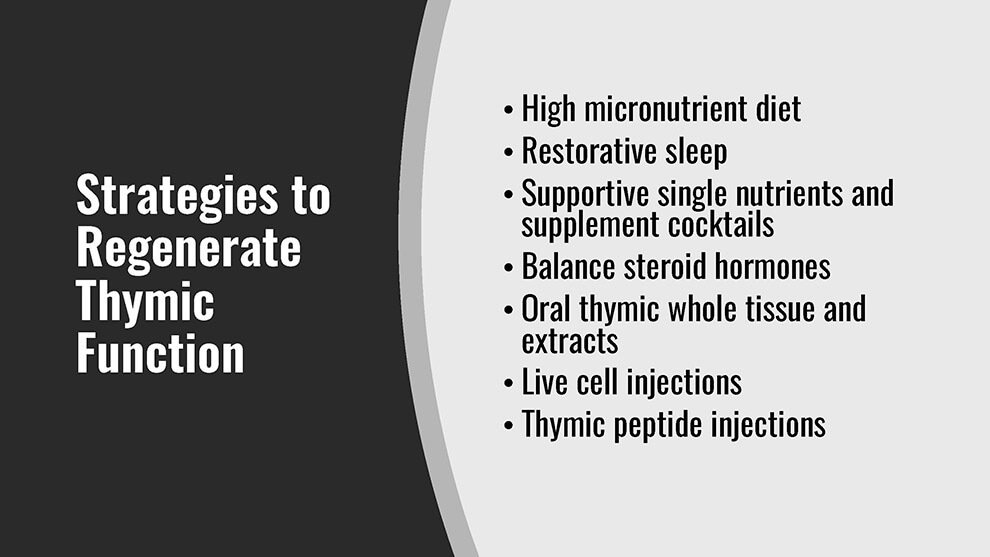
Thymus-Friendly Diet & Lifestyle
There are no specific foods for optimal thymic function. Still, it makes sense that a healthy, plant-based diet high in micronutrients with adequate protein can support healthy immunity and prolong health during aging.
Also, sufficient undisturbed sleep in needed for a well-tuned immune network, including competent thymus function. Taking melatonin improves sleep quality and supports immunity. Animal studies show that melatonin reverses age-related thymic involution and improves the immune function of the spleen.
Nutrients & Plant Compounds
Zinc plays an essential role in growth and development and is necessary for a healthy immune system. A zinc deficiency causes reduced T cell function, slower wound healing, and other immune system defects.[4] Zinc is first line therapy for thymus restoration.
Vitamin A supports the thymus and stimulates the immune response. Daily supplementation with high dose vitamin C maintains the size and weight of the thymus and increases the number of T cells. You also need enough selenium for immunity against viruses and cancer.
Astragaloside IV is an extract of the traditional Chinese medicine Huangqi (Astragalus membranaceous). Traditionally, Huangqi is used to improve energy, build stamina, and prevent common illnesses like a cold or the flu, and to slow aging.
Astragalus contains numerous biochemically active compounds, including polysaccharides, flavonoids, and saponins. These compounds increase telomerase activity, have antioxidant, anti-inflammatory, and immunoregulatory effects. Research using the proprietary extract Astragaloside IV (TA-65) found a significant age-reversal effect in the immune system. Both TA-65 and generic Astragaloside IV are available as nutritional supplements.
Thymus Gland Extracts
Glandular extracts have a long history of use in Europe, as well as in traditional Chinese medicine. Though the biological mechanisms of how they work in the body are not well known, there is clinical evidence that thymus and spleen extracts reduce inflammation, speed wound healing, help eliminate viruses, and inhibit cancer cells. [5]
Thymic Protein A (TPA) is an oral nutritional supplement made from calf thymus with immune-modulating and antiviral properties. Though research is limited, TPA was found to support CD4+ helper T lymphocytes and reverse thymus atrophy, strengthening the thymus’ role of programming T cells. [6]
Immune Supportive Supplement CocktailS
Thymus injections alone are not enough to restore your thymus. A comprehensive approach works best including thymus live cell injections and oral extracts. Immuno Caps from Priority One contain nutrients, the herb echinacea, organ extracts, and thymus enzyme polypeptide fractions. Along with medicinal mushroom extracts and beta-glucan, I find it invaluable in preventing infections. Formulas like this serve as cornerstones for restoring immune integrative.
In my practice, I go beyond the basics, designing personalized prescriptions for patients who need to revitalize their thymus. You may also find customized dosing is a better choice for you. A rule of thumb is the older you are, the higher the potency and dosage you need to restore your thymus function.
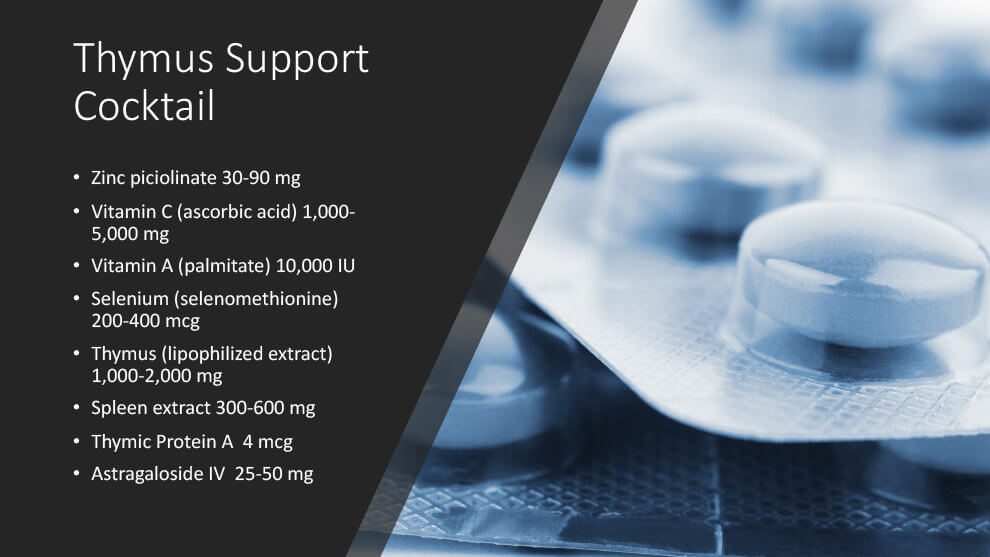
Supercharge Your Thymus Function
So far, I outlined natural ways to maintain and restore your thymus function. These ways are foundational and useful as a starting point. The following information is for those who want to maximize their thymic function for optimal aging, the treatment of chronic disease, and adjunctive therapy for cancer. You need to work with your physician, who can prescribe one or more of these medications.
Thymus Live Cell Injections
So-called “live cell” glandular therapy are pharmaceutically prepared extracts of thymus and other animal glands for injection. The therapeutic goal is to restore immune homeostasis, a natural balanced state of how the body defends against and prevents disease.
A standard course involves intramuscular injections given daily for ten days to prime the immune system. A combination of thymus and spleen cell therapy are used together for immune restoration. Weekly or monthly injections can follow the initial course.[7]
European laboratories follow rigid standards to produce live cell preparations in German and Switzerland. They are considered safe, and reactions are rare. They are not FDA approved for use in the United States; however, you can find naturopathic doctors who provide these therapies.
Thymic Peptides and Hormone Injections
Thymic peptides are pharmaceutical preparations synthesized by E. coli. They help restore and balance the immune response.
Thymalin is the synthetic version of thymulin. It was first isolated from the thymus gland in 1977. Thymalin regulates immune function including lowering inflammation, increases T cell activity, and raises immunoglobulin A, and it has neuroprotective effects. By the time you reach 60 years, your thymus makes almost none. Anti-aging physicians use combinations of thymalin and pineal gland peptides for life extension.
Thymosin Beta 4 (TB-500) protects against viral infections and is used to improve tissue regeneration for wound healing. It also promotes bone remodeling after fractures, including spinal stress fractures due to osteoporosis.
Thymosin Alpha-1 is considered a potent immune regulator. It supports immune function against chronic viruses and fungal infections.
Human growth hormone (HGH) and insulin-like growth factor (IGF-1) improve the function of thymus cells and may influence thymus gland size. During aging, the production of HGH and IGF-1 decline, and immunity weakens. Animal studies show that boosting IGF-1 restores thymic size and function and may increase T cell count. [8]
Thymus Gland FAQs
What is the thymus gland’s function?
Is there a relationship between the thymus gland and longevity?
Can you make the thymus gland healthier?
How can you stimulate the thymus gland?
Can the thymus gland grow back?
What is the best thymus extract?
– T CELL FORMULA from Ecological Formulas
– THYMUS 300 mg from Priority One
– THYMUS (from sheep) Allergy Research
Updated 02/20/2023
Instagram LIVE Q&A
Summary
A healthy, well-functioning thymus gland is necessary to keep you safe from infections and ward off cancer. It also sets the pace of aging. When you’re young, the thymus flourishes. As you grow older, maintaining a competent thymus and preventing glandular shrinking protects against cancer and viral infections, like influenza and coronaviruses. Though zinc is the cornerstone nutrient for a competent thymus, additional nutrients, oral and injectable organ extracts, peptides, and hormones make for a comprehensive plan to regenerate the thymus gland. Governments and researchers spend so much time and money on methods to destroy viruses, including the new coronavirus, but of most of these efforts fail. Vaccination makes more immunological sense, but keeping our own immunity effective is a better solution. Restoring immune homeostasis is an overlooked key to prolonging health during aging.
NOTES
[1] In 2019, Emeritus Professor Jacques Miller received a Lasker Award, one of the highest achievements in medical research, for identifying T and B cells that play critical roles in our immune system.
[2] CD8 T cells are also called cytotoxic or suppressor cells.
[3] T- and B-Lymphocyte and Natural Killer Cell Profile from LabCorp.
[4] The LabCorp range for zinc in plasma or serum is 56-134 µg/dL. However, to support optimal immunity during aging, I aim for a desirable lower limit of 70 µg/dL with an optimal of greater than 85 µg/dL.
[5] When buying glandular extracts, look for grass-fed, organically-raised, preferably New Zealand raised and manufactured.
[6] Thymic Protein A was researched and formulated by Terry Beardsley, Ph.D., an eminent thymus researcher at Baylor College of Medicine, the University of California San Diego, and other top universities. I was very excited about this product when it first became available in the late 1990s. It’s used and endorsed by many leading functional medicine doctors.
[7] Look online for German and Swiss thymus clinics.
[8] You can test your growth hormone and IGF-1 levels from any major medical lab. If low, discuss replacement therapy with your doctor. Both HGH and IGF-1 are daily injections, like peptides, given under the skin.
